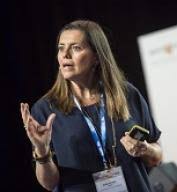Plenary Speakers
 Rayadurgam Srikant (University of Illinois Urbana-Champaign, USA)
Rayadurgam Srikant (University of Illinois Urbana-Champaign, USA)
R. Srikant is a Grainger Distinguished Chair in Engineering, and Professor in the Department of Electrical and Computer Engineering and the Coordinated Science Lab. He is also the Co-Director of the C3.ai Digital Transformation Institute. His research interests include machine learning, applied probability, stochastic control, and communication networks.
He is the recipient of the 2015 INFOCOM Achievement Award, the 2019 IEEE Koji Kobayashi Computers and Communications Award and the 2021 ACM SIGMETRICS Achievement Award. He has also received several Best Paper awards including the 2015 INFOCOM Best Paper Award, the 2017 Applied Probability Society Best Publication Award, and the 2017 WiOpt Best Paper award. He was the Editor-in-Chief of the IEEE/ACM Transactions on Networking from 2013-2017 and is currently an Area Editor for the Mathematics of Operations Research.
Title: “Finite‑Time Bounds for Robust Reinforcement Learning with Linear Function Approximation“
Abstract: Robust reinforcement learning (RL) focuses on designing optimal policies from data for MDPs with model uncertainties. Existing convergence guarantees for robust RL are either limited to tabular settings or use restrictive assumptions in the function approximation setting. We will present an RL algorithm for learning the optimal policy from data in the function approximation setting and provide finite‑time sample‑complexity bounds without requiring generative access to the underlying MDP model. Our algorithm uses a combination of ideas from distributionally robust optimization (DPO), two time-scale stochastic approximation, and traditional (non-robust) fitted value iteration and Q-learning.
 Rosa E. Lillo (UC3M, Spain, and IBidat, uc3m-Santander Big Data Institute, Spain)
Rosa E. Lillo (UC3M, Spain, and IBidat, uc3m-Santander Big Data Institute, Spain)
She has published more than one hundred articles in high-impact international journals, supervised 21 PhD students, and collaborated on numerous projects, both in research and in the application of solutions for businesses and public institutions. In 2012, she received the Excellence Award for Young Researchers from Banco Santander. In the past, she was as a visiting professor at the University of California, Berkeley, and the University of Arizona, Tucson. Since 2005, she has received several awards recognizing her teaching and research contributions and has been a member of various evaluation committees for ANECA and AEI since 2014.
She is also deeply committed to outreach efforts and is the creator of the “STAT WARS” events, which have achieved national and international recognition. Since taking on the leadership of IBiDat, she has intensified the development of R&D&I result transfer through projects with companies, organizations, and public institutions.
Title: “New Frontiers and Applications of the Network Scale-Up Method“
Abstract:
Since our initial encounter with the Network Scale-Up Method (NSUM) through the Coronasurveys (coronasurveys.org) initiative, we have come to appreciate it as a powerful and cost-effective tool for inferring valuable information across diverse domains—including pandemic monitoring, voting intentions, and caregiving dynamics. In this talk, we will explore both the practical strength of NSUM in real-world applications and delve into key methodological aspects, such as its foundations in network theory, statistical robustness, theoretical bounds, and simulation-based validation. This dual perspective aims to highlight the versatility of NSUM and potential in addressing complex societal challenges.
 Patrick Loiseau (Inria, France)
Patrick Loiseau (Inria, France)
He is a research director at Inria and a part-time Professor of computer science at Ecole Polytechnique and at ENSAE, where he is responsible for the computer science courses. Since March 2022, he is the co-head of the FairPlay team, a joint team between Criteo, ENSAE, and Inria Saclay. In 2019-23, he was the co-holder of a Chair of the MIAI@Grenoble Alpes institute on “Explainable and Responsible AI”. Prior to creating FairPlay in Saclay, he was a member of the POLARIS team (a joint Inria/LIG team) in Grenoble. Even earlier, he was an Assistant Professor in the data science department at EURECOM and he spent several long research visits at UC Berkeley and MPI-SWS. In particular, from April 2016 to October 2018, he was a visiting researcher at the Max-Planck Institute for Software Systems (MPI-SWS), supported by a Humboldt fellowship for experienced researchers.
He received his PhD in CS from ENS Lyon in 2009. Prior to that, he studied Physics at ENS Lyon (MSc ’06) and after that he also studied Mathematics at UPMC (Paris 6) and Ecole Polytechnique (MSc ’10). He was a postdoc at Inria Paris in 2010 and at UC Santa Cruz in 2011. He received my HDR from UPMC in 2016.
His research interests revolve around game theory and statistical learning and their interactions, in particular in the context of security, privacy and ethics of online systems and algorithms.
He was the chair of the steering committee of NetEcon and an associate editor of ACM Transactions on Internet Technology and IEEE Transactions on Big Data. He was a PC co-chair of NetEcon ’12-’15 and he serves or have served as a PC member or Area Chair of numerous conferences (FAccT, ECML-PKDD, NeurIPS, ICML, AAAI, IJCAI, SIGMETRICS, PETS, WiOpt, GameSec, etc.), as a guest editor of two journal special issues, as a reviewer for numerous journals and as a member of several evaluation committees for PhDs or panels for grant selection.
Title: The Price of Opportunity Fairness in Matroid Allocation Problems
Abstract:
We consider matroid allocation problems under opportunity fairness constraints: resources need to be allocated to a set of agents under matroid constraints (which includes classical problems such as bipartite matching). Agents are divided into C groups according to a sensitive attribute, and an allocation is opportunity-fair if each group receives the same share proportional to the maximum feasible allocation it could achieve in isolation. We study the Price of Fairness (PoF), i.e., the ratio between maximum size allocations and maximum size opportunity-fair allocations. We first provide a characterization of the PoF leveraging the underlying polymatroid structure of the allocation problem. Based on this characterization, we prove bounds on the PoF in various settings from fully adversarial (wort-case) to fully random. Notably, one of our main results considers an arbitrary matroid structure with agents randomly divided into groups. In this setting, we prove a PoF bound as a function of the size of the largest group. Our result implies that, as long as there is no dominant group (i.e., the largest group is not too large), opportunity fairness constraints do not induce any loss of social welfare (defined as the allocation size). Overall, our results give insights into which aspects of the problem’s structure affect the trade-off between opportunity fairness and social welfare.